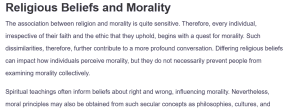Religious Beliefs and Morality
The association between religion and morality is quite sensitive. Therefore, every individual, irrespective of their faith and the ethic that they uphold, begins with a quest for morality. Such dissimilarities, therefore, further contribute to a more profound conversation. Differing religious beliefs can impact how individuals perceive morality, but they do not necessarily prevent people from examining morality collectively.
Spiritual teachings often inform beliefs about right and wrong, influencing morality. Nevertheless, moral principles may also be obtained from such secular concepts as philosophies, cultures, and personal experiences. This diversity allows for a rich dialogue about ethical issues and facilitates awareness of the similarities and differences in moral thinking. Religious and spiritual practices may lead particular people toward particular moral decisions (Gemar, 2024). However, others may approach moral questions from an entirely different standpoint. Finally, recognizing these varied perspectives can result in an enhanced and tolerant definition of morality, which can be beyond religious beliefs.
Religion and morality are interrelated since most of my values are crafted from my Christian background. However, I also realize that people from different religious belief systems would want to apply their spiritual and moral theories on right or wrong. When considering ethical dilemmas on people of other faiths, the best thing to do is to listen and be open-minded. The extent of agreement of interests and ideals can be derived from civilized conversation. Also, the need to determine what makes people different may help revive religion and morality and develop tolerance (Lohmann, 2023). By emphasizing the concern of shared humanity, people can come to better solutions, no matter how much moral worlds differ.
In conclusion, it is possible to see that religion plays a role in morality. If one approaches moral conflict with an open mind, then one can start to fill the gaps created by differences in beliefs. Finally, if people embrace the principles of their common humanity, they are likely to lead to constructive resolutions.
References
Gemar, A. (2024). Institutional Trust, Spirituality, and Religious Practice in the United States. Social Sciences, 13(1), 67–67. https://doi.org/10.3390/socsci13010067
Lohmann, U. (2023). “On Enlightenment in Religion”—Skepticism and Tolerance in Educational and Cultural Concepts within the Berlin and Breslau Haskalah. Religions, 14(3), 326. https://doi.org/10.3390/rel14030326
ORDER A PLAGIARISM-FREE PAPER HERE
We’ll write everything from scratch
Question 
Discussion Post 8
Do not use AI to generate or edit your post. Do not use AI to generate or edit your responses to your peers.
Whatever your religious beliefs (even if you have none!), it is important to recognize that not everybody views religion in the same way. Does that prevent us from also looking at morality in the same way? For you, personally, do you think religion and morality are connected or not? If they are connected, what suggestions do you have for resolving moral disputes with people from different religions than yourself?

Religious Beliefs and Morality
Resources:
Note:
- Assume the client is Christian.